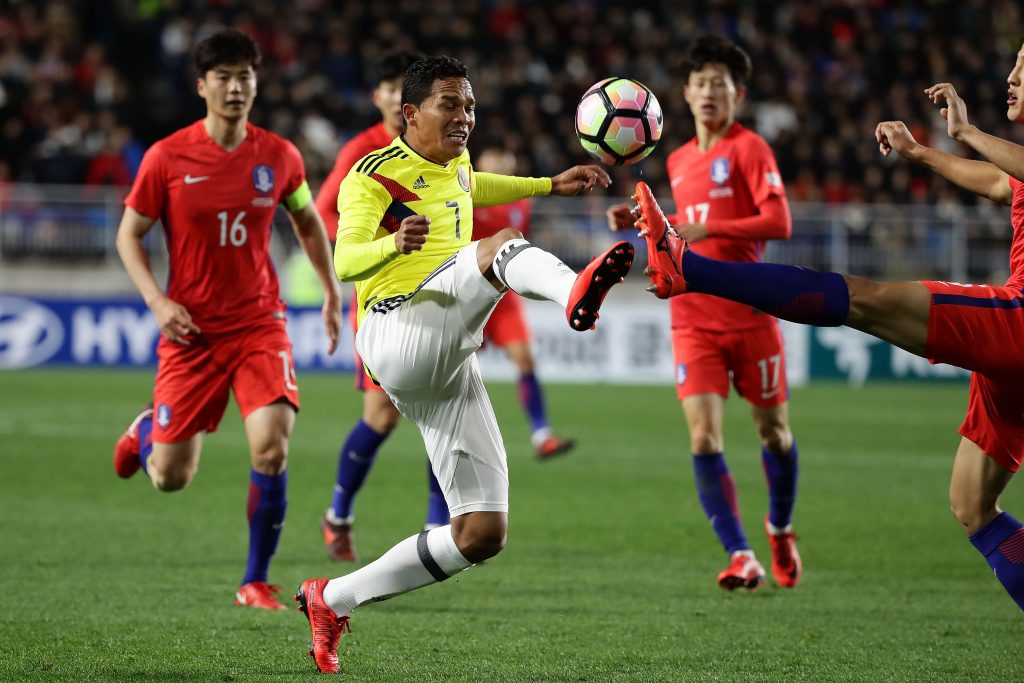Nine years ago, Carlos Bacca was working as a bus driver’s assistant, collecting fares from passengers on the route from his town of Puerto Colombia to Barranquilla. Today, he’s one of the top scorers of the Colombian national team, looking to solidify his standing as a top international soccer star at the World Cup.
There are many rags to riches stories in soccer, but Bacca’s stands out because of his perseverance and work ethic. He wasn’t a teenage prodigy discovered at an early age by a powerful club and taken to Europe. Instead, he had to work his way up the ladder, overcoming obstacles and setbacks, to get to the elite of world soccer.
In just nine years, Carlos Bacca’s life has transformed radically.
Bacca was born to a humble family in the poor neighborhood of Puerto Colombia, about 30 minutes away from Barranquilla. His father, Gilberto, worked as a fisherman, but never wanted his sons to follow in his footsteps. They did, however, inherit his love for soccer. “Since he was three it was the (soccer) ball, only the ball. We bought him cars, but he didn’t want them, he only wanted the ball,” said Bacca’s mother, Eloísa Ahumada, recalled in a 2014 interview.
His parents encouraged his passion, but were strict with school. Regardless, he constantly escaped to play in a dirt field a block away from his house. At age nine, they enrolled him in a local soccer academy “We would finish the activities of the academy and he stayed …and he wouldn’t go home until sundown,” said Rafael Reyes, his first instructor. “He would stay with a couple other kids and they would head crosses, do scissor kicks… he trained himself,” Reyes remembers.
However, his talent didn’t have a chance to shine outside his neighborhood and Bacca put soccer aside after graduating from high school to help his family. He sold the fish his father caught and later found a job as bus driver assistant. The bus company decided to create a soccer team and Bacca became its star forward, leading them to win a local championship. His bosses were so happy, they promoted him to bus schedule controller, a job that allowed him time to train again.
The next year, Bacca saw the other side of his boss’ enthusiasm. His high school friends had assembled a team and ended up facing Bacca’s company in a match. He missed a decisive penalty kick in that game and as a result, the owner of the bus company fired him. But by that moment some people had already noticed his talent. A girlfriend’s uncle got him a tryout with the second team of Barranquilla FC, which plays in the Colombian second division. When Bacca passed the test, the uncnle invited him to live with his family in Barranquilla, so he could be closer to the training grounds.
Bacca’s goals with Barranquilla led him to the second division of Venezuelan soccer, where he helped Minerven return to the top category. Despite an offer to stay, he returned to Barranquilla FC, where he was noticed by Atletico Junior, the biggest team in the city and seven-time winner of the Colombian Championship. He made his first division debut at age 22 – old by soccer standards – in the second half of a 0-0 game against Deportivo Pasto. In 20 minutes he scored two goals, securing a win for his team and winning the hearts of fans in the process.

In only three years with Junior, Bacca scored 74 goals and won two leagues. It wasn’t long before Europe came calling. In 2011 he was hired by Club Brugge of Belgium. There, he became the top scorer of the league in the 2012-2013 season, and was selected as the best player of the tournament. He later went on to the Spanish powerhouse Sevilla, where he won two Europa Leagues, scoring two goals in the 2014 final.
After a bittersweet spell at troubled Italian giant AC Milan, Bacca returned to Spain to play for Villareal, where his goals secured him a spot on the Colombian national team. He’ll play his second World Cup in Russia, now as a consolidated and experienced player who can serve as a partner to Radamel Falcao.
In just nine years, Carlos Bacca’s life has transformed radically, but in many ways he remains the same kid that sold bus tickets. “I think it was very useful for me to grow up (in Puerto Colombia) watching my parents putting in so much effort. They are still doing it, because even though we’re fine in terms of money, my father keeps working because he likes it,” Bacca told the Spanish daily Marca. “You learn those values and apply them day by day.”







